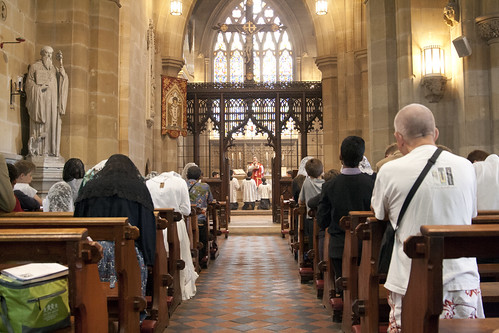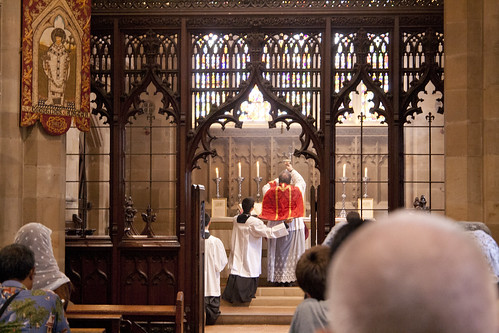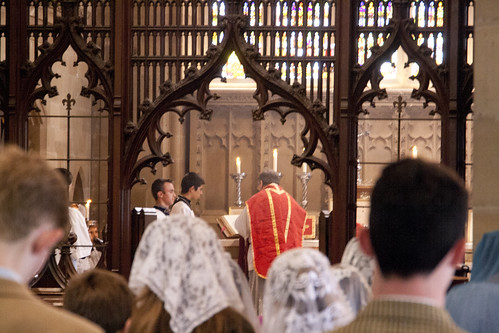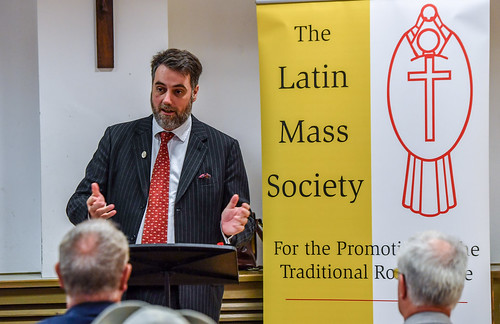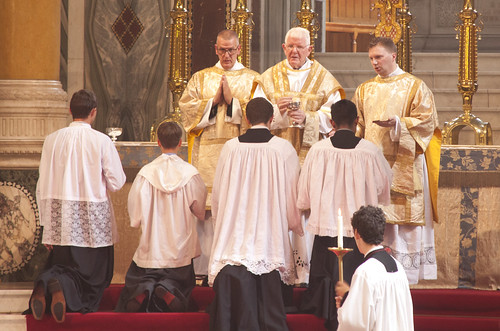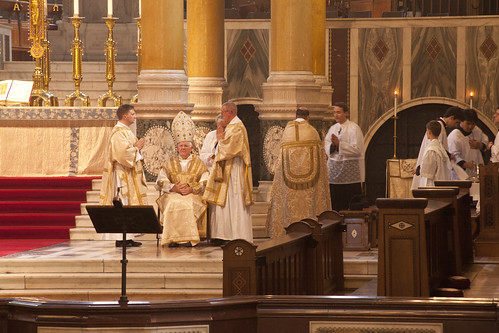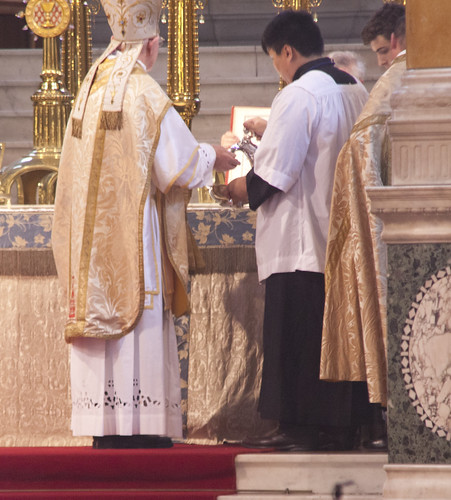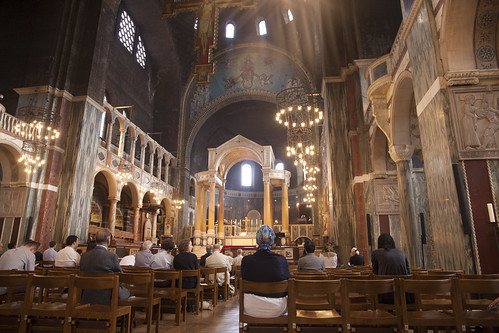Chairman's Blog
SCT Summer School: some photos
I have had trouble getting my photos of the St Catherine's Trust Summer School off the memory cards, but here are some, at last. The Summer School took place 27th July to 3rd August, in the Divine Retreat Centre, which is over the road from St Augustine's Shrine in Ramsgate.
It was a great privilege to be able to have Mass during the Summer School in the Shrine church, which thanks to recent restoration, now looks as Pugin intended it, with a splendid Rood Screen. In these photographs Fr Andrew Southwell, our Chaplain, is celebrating Mass.
Sohrab Ahmari: the story of his conversion
Support the Latin Mass Society
Patreon page launched
I thought I would experiment with a Patreon page. My thought is that I am producing a fair mumber of articles, and from time to time doing long audio interviews, for which I am not paid, and often are not easily seen by my regular readers.
If people would like to support this work, and the other things I do, they can do so through Patreon, and I can make some of this material available to them.
So here is the link: Become a Patron!
Support the Latin Mass Society
Roosh takes the 'God' pill
My latest on LifeSite is about Roosh, the writer of 'Game' books: books about how to pick up women. Particularly in light of his repudiation of meaningless sex, I am planning to write more about him, probably on this blog.
-------------------
New Mass of Ages
 In this issue:
In this issue:
• We celebrate the Ordination of four men, in the Traditional Rite, by Bishop Philip Egan in his Cathedral in Portsmouth • Joseph Shaw explains the ‘Confirmation slap’
• A selection of pictures from our recent pilgrimage to Holywell
• Maurice Quinn remembers the Dorset men who died for the Faith – the Chideock Martyrs
• Jonathan Luxmoore explains why Polish Catholics rally to their Church undeterred by a new crisis
• Fr Lawrence Lew OP on the traditional liturgy and Catholic masculinity
• Joseph Shaw explains how Catholic Linguistic Survivals from the Ancient Liturgy are embedded in the fabric of our lives
Schola Sainte-Cécile in England 2019
Review of Stephen Bullivant in Catholic Herald
I'm late posting this on here but my latest in the Catholic Herald is a review of Mass Exodus by Stephen Bullivant. It begins:
Was Vatican II in some way responsible for declining Catholic practice and “affiliation” (people calling themselves Catholics), or is this phenomenon a matter of trends beyond the Church’s control? Focusing on Britain and the United States, Professor Stephen Bullivant, a sociologist of religion at St Mary’s University, London, presents the evidence with precision, while still producing a highly readable book. The thesis of Mass Exodus is that the Church, like other ecclesial bodies, has clearly faced considerable headwinds since the 1960s as a result of wider social forces, but has also made things worse for itself.
Bullivant’s analysis revolves around three key sociological concepts. The first is the role of networks in nurturing belief, or “social network theory”. The denser the social network of believers, the more they are connected with each other (as opposed to non-believers), and the lower will be the rate of lapsation and disaffiliation. The Amish, for example, with their distinctive way of life and close-knit community, have a very low level of disaffiliation. Catholics were never like them, but up to the 1960s there was, to some degree, a “Catholic ghetto” in both the US and Britain where, in a hostile world, they had social support from fellow believers. The community was marked out by customs such as eating fish on Friday, distinctive forms of worship and spirituality, and interest in a common history, particularly of persecution.
Carry on reading.
Two ideas for stemming lapsation
AGM Mass in Westminster Cathedral
People are not quite so starved of the Traditional Mass today, and this one Mass doesn't attractice such an enormous crowd. About that many people, by my estimation, attend a Latin Mass on any given Sunday. Many of those at the Mass in 1972 probably hadn't attended any for a year or more. Indeed, most Masses were celebrated in the vernacular from 1965, and at the same time the rubrics and prayers began to chance quite radically.
It is a reflection of the febrile atmosphere that the report of this Mass in 1972 is the first mention the Catholic Herald made to the 'Indult granted last year to England and Wales by the Pope at the Cardinal's request'. Why hadn't they mentioned it when it was granted? It had been reported in full in The Times, whose editor, William Rees-Mogg, was one of the petitioners, along with Agatha Christi, asking for it. The Catholic papers were told to keep it quiet.
Although not as well-attended as in 1972, our AGM was, as always, a jolly affair. We provide sandwich lunch (with wine) to attendees (on payment of a nominal £5) and it is a chance for anyone to talk to the Society's Officers (and staff) formally, at the meeting, or informally, over lunch. We were addressed by Bishop Campbell who gave us a little talk about St Augustine of Hippo: he is an Augustinian. We look forward to seeing him again at the Annual Requiem in Westminster Cathedral, which falls on All Souls Day this year.
Support the Latin Mass Society
Why do people lapse? More from Stephen Bullivant
 My latest on LifeSiteNews. This post focuses on a shorter book of Prof Bullivant, which has also come out this year. One of the interesting and perhaps counter-intuitive results of the survey of lapsed Catholics he carried out for Portsmouth Diocese is that the lapsed are not all what you might call liberal ex-Catholics: they include a fair number of conservative or even traditionalist ex-Catholics. I think it might be tempting to think of the more conservative type of Catholic as the core vote who are least likely to leave, people with a higher level of committment. The truth is more complicated. People who want traditional liturgy, beautiful churches, and clear teaching, can lose heart and lapse. Indeed, 10% of respondents even agreed (or 'strongly agreed') with the statement 'I prefer the Latin Mass but there is none in my area.'
My latest on LifeSiteNews. This post focuses on a shorter book of Prof Bullivant, which has also come out this year. One of the interesting and perhaps counter-intuitive results of the survey of lapsed Catholics he carried out for Portsmouth Diocese is that the lapsed are not all what you might call liberal ex-Catholics: they include a fair number of conservative or even traditionalist ex-Catholics. I think it might be tempting to think of the more conservative type of Catholic as the core vote who are least likely to leave, people with a higher level of committment. The truth is more complicated. People who want traditional liturgy, beautiful churches, and clear teaching, can lose heart and lapse. Indeed, 10% of respondents even agreed (or 'strongly agreed') with the statement 'I prefer the Latin Mass but there is none in my area.'
You know how many lapsed Catholics there are? The massive and authoritative British Social Attitudes Survey indicates that there are 3.7 million in the UK. If anything like 10% of these, plus who knows what percentage of practicing Catholics, prefer the Latin Mass, even when most Catholics under 70 do not even know what it is like, then our bishops are clearly missing a trick in not making sure it is available.
-----------

